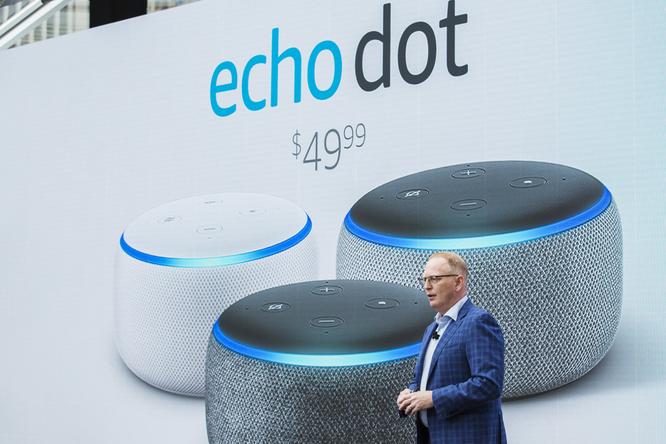Amazon revealed on Tuesday new Ring and Alexa-powered products that will undoubtedly bring new levels of convenience into users' homes. What may be more remarkable than the products, however, is the resilience of the company's device sales given its struggling reputation among corporate and tech watchdogs.
Read more: Amazon Echo and Ring event showed off the Halo View fitness tracker
At its product event, Amazon took pains to address its lagging rep. "Privacy is foundational to everything we do," Dave Limp, who runs the company's devices and services operations, said at the start of an hour of nonstop product releases that included the Astro robot powered by the Alexa voice assistant. The robot is designed, Amazon says, to respect privacy and can be set to no-go zones for the device.
Perhaps Amazon's biggest privacy development: on-device processing for its Echo Show 15. That means you'll have the choice to have the Alexa-powered smart display recognize your face and give you personalized options without sending all that data to Amazon's cloud.
The privacy refinements come as Amazon addresses a host of privacy and security concerns, particularly with its Ring line of security cameras. To address the issues, Amazon has folded in features that protect users' home cameras from hackers, encrypt data going over Amazon's servers to prevent the company from having access and add transparency about how it partners with police departments.
Echo, the line of Alexa-equipped smart speakers, has also raised privacy concerns. Always ready to listen, the speakers have prompted questions about who monitors voice recordings and how thoroughly records of your chats with Alexa are purged from Amazon's systems after you delete them. In response, Amazon changed features to allow users to opt out of human monitoring for conversations and increased users' ability to delete both recordings and transcripts of their chats with Alexa. More generally, the devices have spurred privacy experts to warn that they could violate child privacy laws and that parents should think carefully before introducing new levels of surveillance to children's homes.
None of those concerns, however, appears to have affected the popularity of Amazon's Ring and Echo lines, as well as its Halo fitness trackers and Fire TV streamers. The e-tailer doesn't break out sales from products in its earnings, but it commands towering positions in some smart home product categories. The Echo line essentially created smart speakers and held more than 28% of the global market in 2020, followed by Google's devices, and 70% of the US market as of 2019. Ring security cameras top the market, followed by Arlo products. Amazon's Fire TV is the most popular media streaming stick, with more than 12% of the competitive market.

"We're focused on making customers' lives better by building devices and services that help keep us connected to the people and things that matter most," an Amazon spokesperson said in a statement prior to the event. The statement said customers havetransparency about the company's technologies and "control over their experience."
Now playing:Watch this: Biggest announcements from Amazon's fall event10:56Part of the appeal for consumers is price. Amazon offers convenient, functional products without the premium Apple charges. Like Apple's products, Amazon's products -- whether made in house or by manufacturing partners -- integrate nicely with each other. They also take advantage of the huge and loyal customer base of Prime memberships, which together with other subscription services earned Amazon nearly $8 billion in revenues in the second quarter of 2021.
The combination is hard to beat, regardless of whether you're another tech company or a privacy advocate warning consumers to be careful.
"It's easy to sell people new stuff when they already buy regularly and when you have their email information and shipping history," said Michael Pachter, an analyst with WedBush.
Amazon's devices aren't its sole cause of controversy. The company has also come under scrutiny from labor advocates and antitrust regulators for its domination of the US e-commerce and cloud sectors and for its treatment of front-line workers, who fulfill orders from Amazon's website. Corporate employees have alleged racial and gender discrimination in the workplace, in addition to organizing a walkout over Amazon's impact on the environment.
The public is conflicted about the company, according to sentiment polling. Amazon is liked by 68% of US survey respondents, according to YouGov, and disliked by 15%. But more than half of Americans polled by the Pew Research Center recently said major tech companies should face more regulation, and 68% of respondents said tech titans have too much "power and influence in today's economy." A 2019 poll by CNBC found a majority of US respondents said Amazon is bad for small businesses.
Worries about Amazon might not trump pocketbook decisions, particularly when it comes to smart home products or its marketplace.
"Some individuals will never get past relating smart devices to privacy," said Brendan Witcher, an analyst with Forrester. Still, sales indicate that consumers prioritize convenience. As people use the product, they'll become "so comfortable with Alexa that it will start to feel like she is part of the family."
Home Security Smart SpeakersHard News Ring Amazon PrimeAlexaGoogle AppleNotification on Notification off Amazon







